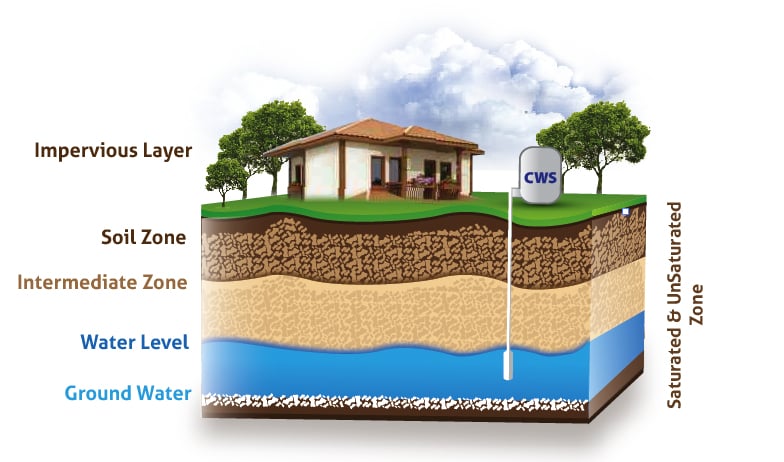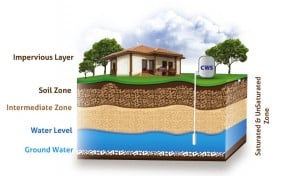Two Signs Your Water Well Is In Trouble


The typical modern residential well can produce many years of excellent water with a minimum of servicing. Precisely because most wells operate for many years without any maintenance, many homeowners may not understand that their well requires service or routine maintenance right up until it is too late. The good news is there are some tell-tale signs it is possible to look for that may alert you to well water problems.
How The Common Deep Well Pump System Works
Typical domestic water wells have a submersible pump that is immersed under the water and pumps water directly to the house. Some wells have pumps called “jet pumps” which are located on the top of the well. Most well pumps are often used in conjunction with a pressure tank.
The aim of the well water pump system is to maintain a constant supply of pressurized water inside your home and piping system. In order to maintain your water pressure the well pump is switched on and off with a pressure switch. This usually means the pump is turned on when the pressure switch senses the pressure is at a minimal point (the “cut-in” point) and off at a pre-set high pressure point (the “cut off” point).
In some systems there is no simple on and off pressure switch but rather a pressure sensing unit that works using a controller to allow the water pump to pump more or less water in a gradual method. This type of system is known as a “continuous pressure” system. This approach uses a variable speed pump, that allows the pump motor to rotate more rapidly or more slowly, and pump water a lot faster or more slowly based on the pressure sensing unit. These types of pumps are becoming ever more popular however the most common is the simple on and off pump system uses a simple pressure switch.
The Well Is Pumping Air
If you turn on your kitchen faucet and out blasts a mixture of air and water, this can be an indication that something is drastically wrong within the well. The worst case scenario is that your water table has dropped to a point that is at or below the well pump, and the pump is drawing in air sometime during the pump cycle. Another cause would be that the well pump drop pipe (the pipe that connects the pump to the top of the well and the water system) is broken. Drop pipes are made of either iron pipe or plastic PVC or poly pipe. They may become broken or corroded and develop cracks or even in some instances break apart, making it possible for air to be sucked in. This kind of problem needs to be looked into and repaired by a skilled well or pump company.
In some cases, the water level is fine and there aren't any cracked pipes or fittings. Some ground water tables do contain various types of gas. These gasses may be dissolved within the water, yet later come out of solution and trigger water to spurt or sputter out of the tap. These types of gasses may be carbon dioxide, methane, hydrogen sulfide or other gasses, and can be harmful and cause significant safety and health problems. In the event that this is an on-going problem the well can usually be treated to eliminate these gasses by means of aeration and degassing systems.
The Electricity Bill Is Suddenly Very High
When a pump wears out, or becomes blocked with sand, silt or iron bacteria it needs to work much harder than if it was in good shape. This can result in an increasingly higher power cost. A different common cause of a higher energy cost happens when the check valve from the well goes bad. This enables water from your pressure tank to flow back down into the well, which then reduces pressure and signals to the pressure switch to turn the pump on again and pressurize the pressure tank. This off and on cycle can happen every couple of minutes and quite simply enable the well pump to run practically 24 hours a day, causing a high power bill.
Recent Posts
U.S. Water Problems by Region: Common Contaminants & Solutions
Curious about U.S. water problems by region? Water quality isn’t just a national issue—it’s a…
Wildfire Water Contamination: How to Ensure Safe Water After a Fire
Wildfire Water Contamination: What You Need to Know After the Fires Wildfire water contamination poses…
Clean Water For Pickles: The Secret Ingredient
Using clean water for pickles is not just a best practice—it’s crucial for achieving great…
How to Test and Remove Manganese in Well Water: A Complete Guide
If you rely on a well for your home’s water supply, you might have encountered…
Effects of Chlorine and Hard Water on Skin: Top Skin Problems and Solutions
Effects of Chlorine and Hard Water on Skin: Top Skin Problems and Solutions Have you…
How Whole House Water Filters Keep Your Family Safe: A Mom’s Guide
When creating a safe and healthy environment at home, clean water is essential—especially for moms…



